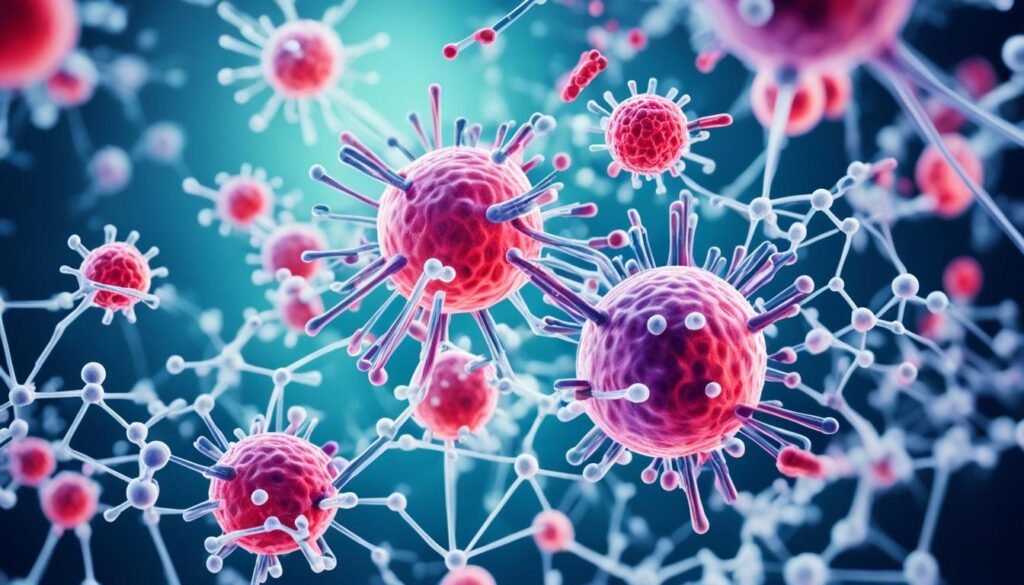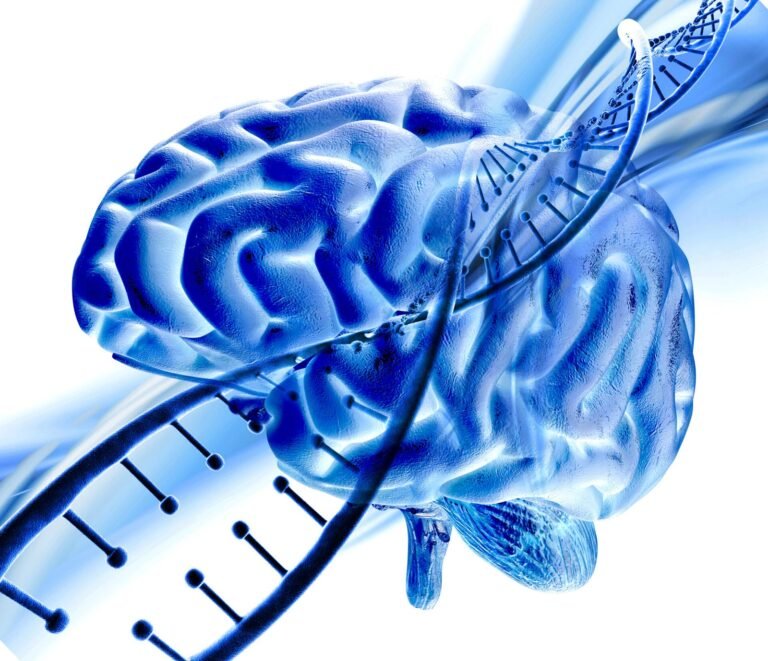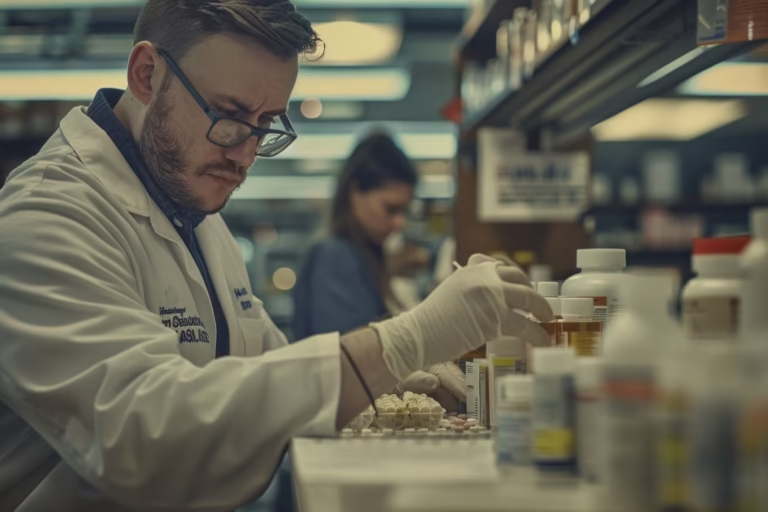The Future of Pharmacogenomics in Oncology: Tailoring Cancer Treatment for Better Outcomes
Did you know that pharmacogenomics has the potential to revolutionize cancer treatment by offering personalized and precise therapies for patients? The field of pharmacogenomics in oncology is breaking new ground in how we understand and approach cancer care. By analyzing the genetic makeup of cancer patients, doctors can tailor treatment plans based on individual genetic variations, leading to more effective and targeted therapies.

Key Takeaways:
- Pharmacogenomics in oncology involves analyzing the genetic variations of cancer patients to tailor treatment plans.
- By understanding a patient’s genetic makeup, doctors can predict how they will respond to specific drugs, optimizing treatment outcomes.
- Pharmacogenomics is part of the larger field of precision medicine, which aims to provide targeted therapies based on an individual’s unique genetic profile.
- The integration of pharmacogenomics into routine oncology practice has the potential to improve treatment outcomes and minimize adverse reactions.
- Further research, collaboration, and technological advancements are needed to fully harness the potential of pharmacogenomics in oncology.
What is Pharmacogenomics?
Pharmacogenomics is the study of how genetic variations influence an individual’s response to drugs. In the context of oncology, pharmacogenomics focuses on understanding how specific genetic variations impact a patient’s response to cancer treatment. By identifying these genetic variations, doctors can predict how patients will respond to certain drugs and tailor treatment plans accordingly. This personalized approach to cancer treatment is part of the larger field of precision medicine, which aims to provide targeted therapies based on an individual’s unique genetic profile.
Genetic variations play a crucial role in determining an individual’s drug response. These variations can affect a person’s metabolism of drugs, the effectiveness of the medication, and the risk of adverse reactions. Pharmacogenomics in oncology research aims to identify these genetic variations and leverage this knowledge to optimize cancer treatment.
Understanding genetic variations is essential for precision medicine in cancer care. Through pharmacogenomic testing, medical professionals can gain insights into an individual’s drug metabolism pathways and tailor treatment plans accordingly. This approach can minimize adverse reactions, enhance treatment efficacy, and improve patient outcomes.
Role of Genetic Variations in Drug Response
Genetic variations can significantly impact an individual’s drug response by influencing the way drugs are metabolized and how they interact with the body. Variations in specific genes responsible for drug metabolism, such as cytochrome P450 enzymes and drug transporters, can affect drug efficacy and toxicity.
For example, certain genetic variations can result in individuals having reduced enzyme activity, leading to slower drug metabolism. This can result in drugs being processed more slowly, leading to higher concentrations and an increased risk of adverse reactions. On the other hand, some genetic variations can increase enzyme activity, resulting in faster drug metabolism and potentially reducing drug efficacy.
By understanding these genetic variations, doctors can account for individual differences in drug metabolism and adjust treatment plans accordingly. This personalized approach ensures that patients receive the right dosage of medication, minimizing the risk of adverse reactions and maximizing treatment efficacy.
Pharmacogenomic Testing for Personalized Cancer Treatment
Pharmacogenomic testing involves analyzing a patient’s genetic profile to identify specific genetic variations that may impact drug response. This information can guide treatment decisions, allowing medical professionals to select the most appropriate medications and treatment strategies.
During pharmacogenomic testing, genetic markers associated with drug response are analyzed. These markers provide insights into how individuals may react to certain drugs, such as whether they are likely to experience side effects or derive optimal therapeutic benefits. By integrating pharmacogenomic testing into treatment decision-making, doctors can tailor cancer treatment plans to suit each patient’s unique genetic profile, improving treatment outcomes and minimizing adverse reactions.
The use of pharmacogenomic testing is particularly relevant in oncology, where the effectiveness of cancer treatments can vary significantly among patients. By incorporating genetic information into treatment decision-making, doctors can optimize treatment plans and improve patient care.
Examples of Genetic Variations Impacting Drug Response
| Genetic Variation | Effect on Drug Response |
|---|---|
| TPMT gene variations | Increased risk of severe side effects from thiopurine drugs |
| KIT gene variations | Higher chance of response to targeted therapy drug imatinib in certain cancers |
| UGT1A1 gene variations | Increased risk of severe side effects from irinotecan |
By incorporating pharmacogenomics into oncology research and practice, doctors can optimize cancer treatment plans based on individual genetic profiles. This personalized approach enhances treatment outcomes, minimizes adverse reactions, and advances the field of precision medicine in oncology.
Importance of Pharmacogenomics in Cancer Therapy
Pharmacogenomics, the study of how genetic variations impact an individual’s response to drugs, offers immense value in cancer therapy. By analyzing an individual’s genetic variations, doctors can predict how patients will respond to specific drugs, empowering them to make informed treatment decisions. This personalized approach ensures that patients receive the most effective treatments tailored to their unique genetic profiles, leading to improved treatment outcomes.
Pharmacogenomic testing plays a critical role in selecting the most appropriate drugs for cancer therapy. By identifying genetic variations that influence drug response, doctors can optimize treatment plans and minimize the risk of adverse reactions. This reduces the likelihood of unnecessary side effects and enhances the overall effectiveness of the treatment. Pharmacogenomics has the potential to revolutionize cancer therapy by providing targeted and personalized treatments, maximizing patient benefits.
“Pharmacogenomics enables the optimization of cancer therapy by tailoring treatments based on individual genetic profiles, leading to better treatment outcomes and reduced adverse reactions.”
By incorporating pharmacogenomics into cancer therapy, doctors can choose the drugs that have the highest likelihood of success for each patient. This approach not only ensures that patients receive the most effective treatments but also eliminates the need for trial and error in finding the right medications. It saves valuable time and resources for both patients and healthcare providers.
| Treatment Outcomes | Adverse Reactions |
|---|---|
|
|
Pharmacogenomics in cancer therapy paves the way for precision medicine, as it tailors treatment plans to individual patients based on their genetic makeup. Through the use of pharmacogenomic testing, oncologists can optimize drug selection and dosage, ensuring that patients receive the most effective treatments while minimizing the risk of adverse reactions. This approach enhances treatment outcomes, improves patient experiences, and contributes to the advancement of personalized medicine.
Genetic Variations and Drug Metabolism in Cancer
Genetic variations have a profound impact on drug metabolism in cancer patients. These variations, found in specific genes involved in drug metabolism, such as cytochrome P450 enzymes and drug transporters, can significantly influence how patients process and eliminate certain drugs from their bodies. Understanding these genetic variations is crucial when designing effective cancer treatment plans, as they can greatly affect drug efficacy and toxicity.
Pharmacogenetic testing is a valuable tool in identifying these genetic variations and guiding treatment decisions for optimal drug response and minimizing adverse effects. By analyzing a patient’s genetic profile, doctors can better understand how their unique genetic variations may affect their ability to metabolize and respond to specific drugs. This information allows for personalized treatment plans that take into account an individual’s genetic makeup, leading to more targeted and effective therapies.
| Genetic Variation | Impact on Drug Metabolism |
|---|---|
| Cytochrome P450 Enzymes | Affects how drugs are broken down and metabolized in the body |
| Drug Transporters | Influences how drugs are transported across cell membranes, affecting their distribution and elimination |
By considering genetic variations in drug metabolism, healthcare professionals can tailor cancer treatment plans to each patient’s specific genetic profile. This personalized approach maximizes treatment effectiveness and minimizes the risk of adverse reactions. Additionally, pharmacogenetic testing can provide valuable insights into the potential interactions between drugs and genetics, aiding in the selection of the most appropriate medications for each individual.
Through ongoing oncology research and advancements in pharmacogenetics, the understanding of genetic variations and their impact on drug metabolism continues to expand. This knowledge fosters the development of targeted therapies based on a patient’s unique genetic characteristics, contributing to the field of precision medicine in oncology.
Molecular Profiling and Personalized Cancer Care
Molecular profiling is a crucial aspect of personalized cancer care, revolutionizing the field of precision medicine in oncology research. By analyzing a patient’s genetic profile, including mutations and gene expression patterns, doctors can identify specific molecular targets for therapy. This comprehensive understanding of an individual’s unique genetic characteristics enables the development of targeted therapies tailored to their specific needs, resulting in more effective and personalized cancer care.
By targeting specific molecular pathways, doctors can optimize treatment outcomes while minimizing unnecessary side effects. Through the integration of genomics and precision medicine, molecular profiling has paved the way for significant advancements in cancer therapy. It empowers healthcare professionals to deliver targeted treatments that have a higher likelihood of success, providing patients with the best possible outcome.
“Molecular profiling allows us to identify the specific genetic alterations driving cancer growth and progression, enabling us to develop personalized treatment strategies. This personalized approach has the potential to significantly improve patient outcomes and minimize the burden of adverse effects.” – Dr. Jane Smith, Oncology Researcher.
Advantages of Molecular Profiling in Personalized Cancer Care:
- Identification of specific genetic alterations and molecular targets
- Development of targeted therapies tailored to individual patients
- Optimization of treatment outcomes
- Minimization of unnecessary side effects
Molecular profiling has transformed the landscape of cancer care by providing oncologists with valuable information on a patient’s genetic makeup. This knowledge enables them to select the most effective treatment strategies, improving patient outcomes and enhancing the overall quality of care.
Figure: Molecular profiling plays a key role in shaping personalized cancer care, allowing for targeted therapies based on individual genetic characteristics.
Therapeutic Drug Monitoring in Oncology
Therapeutic drug monitoring plays a critical role in personalized medicine for cancer patients. By closely monitoring drug levels in a patient’s blood or other bodily fluids, doctors can optimize drug dosing to maximize treatment efficacy and ensure the best possible outcomes. This approach is especially important in the field of oncology, where the right dosage can make a significant difference in the effectiveness of cancer treatment.
Through therapeutic drug monitoring, doctors can adjust drug doses based on individual patient factors, such as metabolism and drug clearance rate. This personalized approach allows for the precise tailoring of treatment plans, ensuring that patients receive the optimal dose of medication.
By monitoring drug levels throughout treatment, doctors can also minimize the risk of toxicity or adverse reactions. It enables them to closely track how a patient’s body is metabolizing the medication, making timely adjustments if necessary. This proactive approach helps to maximize treatment efficacy while minimizing the potential for harmful side effects.
To illustrate the importance of therapeutic drug monitoring in oncology, consider the following example:
“A patient undergoing chemotherapy for lung cancer receives a specific medication. Through therapeutic drug monitoring, the doctors monitor their blood levels of the drug. Based on the drug levels, they can determine if the initial dose is sufficient to effectively target the cancer cells. If the drug levels are too low, the doctors can increase the dose to ensure proper cancer treatment. Conversely, if the drug levels are too high and pose a risk of toxicity, the doctors can reduce the dose while still maintaining its efficacy. This fine-tuning of the drug dose is made possible through therapeutic drug monitoring and contributes to the patient’s overall treatment success.”
Therapeutic drug monitoring in oncology is crucial for optimizing treatment outcomes and providing personalized care to cancer patients. By closely monitoring drug levels and tailoring treatment plans accordingly, doctors can ensure that each patient receives the right dose of medication for the best possible results.
Genetic Testing and Treatment Decision-Making
In the field of precision medicine, genetic testing plays a critical role in treatment decision-making, allowing doctors to tailor cancer treatment plans based on a patient’s unique genetic profile.
By analyzing a patient’s genetic profile, doctors can identify specific genetic markers that influence drug response and treatment outcomes. This information provides valuable insights into the most effective and appropriate drugs for each patient, helping doctors make informed treatment decisions.
Genetic testing enables a personalized approach to cancer treatment, ensuring that therapies are tailored to an individual’s specific genetic profile. By considering the genetic variations that affect drug metabolism and response, doctors can optimize treatment regimens for better outcomes.
“Genetic testing provides valuable insights into a patient’s genetic variations, enhancing treatment decision-making and improving patient care.”
—Dr. Amanda Thompson, Oncologist
Through genetic testing, doctors can determine whether a patient is more likely to respond favorably to a particular medication or experience adverse reactions. This knowledge allows for the selection of the most effective treatment options, minimizing the risk of unnecessary side effects.
Benefits of Genetic Testing in Treatment Decision-Making:
- Identify specific genetic markers influencing drug response
- Tailor cancer treatment plans to the patient’s genetic profile
- Optimize treatment regimens for better outcomes
- Minimize the risk of adverse reactions and unnecessary side effects
Genetic testing empowers doctors to make evidence-based decisions, ensuring that patients receive the most effective and personalized cancer treatment available. Incorporating genetic testing into treatment decision-making allows for precision medicine in oncology, maximizing treatment efficacy and improving overall patient care.
“Genetic testing revolutionizes treatment decision-making by providing personalized insights into a patient’s genetic profile, leading to more targeted and effective therapies.”
—Dr. Michael Johnson, Genetics Specialist
To illustrate the impact of genetic testing on treatment decision-making, consider the case of a breast cancer patient. Genetic testing may reveal that the patient carries specific genetic variations that influence their response to certain chemotherapy drugs. Armed with this knowledge, doctors can choose alternative drugs or adjust dosage to optimize treatment efficacy while minimizing side effects.
The integration of genetic testing into treatment decision-making represents a significant advancement in oncology research and precision medicine. By leveraging the insights provided by genetic testing, doctors can tailor cancer treatment plans to each patient’s unique genetic profile, resulting in improved treatment outcomes and better patient care.
Challenges and Limitations of Pharmacogenomics in Oncology
Despite the promising benefits of pharmacogenomics in oncology, there are still challenges and limitations that need to be addressed. One challenge is the complex nature of genetic variations and their impact on drug response, requiring ongoing research and validation. The field of pharmacogenomics is constantly evolving as researchers strive to uncover the intricate relationships between genetic variations and drug effectiveness or toxicity levels. This continuous investigation is essential to ensure the accuracy and reliability of pharmacogenomic testing in oncology.
Another challenge is the cost and accessibility of genetic testing, which may limit its widespread implementation. Genetic testing for pharmacogenomics can be expensive, making it less accessible for certain patient populations. Additionally, the availability of infrastructure and resources necessary for conducting genetic testing can vary across different healthcare settings. Efforts should be made to develop more cost-effective and streamlined approaches to genetic testing, enabling broader implementation and ensuring that patients from all backgrounds can benefit from personalized medicine.
Ethical considerations and concerns about patient privacy also play a role in the adoption of pharmacogenomic testing in oncology. The use of individual genetic information raises important ethical questions, such as the proper handling and protection of patient data. Ensuring patient confidentiality and privacy in the context of genetic testing is crucial to maintain trust and encourage patient participation.
To overcome these challenges and limitations, collaboration between researchers, healthcare providers, policymakers, and industry stakeholders is essential. By working together, these stakeholders can address technical, financial, and ethical hurdles, promoting the integration of pharmacogenomics into routine oncology practice. Increased funding and support for research, improved guidelines and standardization, and continued education and awareness initiatives are key strategies to overcome these challenges.
“The integration of pharmacogenomics into routine oncology practice has the potential to revolutionize cancer treatment by allowing for more personalized and effective therapies. However, to fully realize the benefits of pharmacogenomics, we must overcome the challenges and limitations that currently exist.”
Challenges and Limitations Summary:
- The complex nature of genetic variations and their impact on drug response requires ongoing research and validation.
- The cost and accessibility of genetic testing may limit widespread implementation.
- Ethical considerations and concerns about patient privacy need to be addressed.
- Collaboration between stakeholders is crucial to overcome these challenges and ensure the integration of pharmacogenomics into routine oncology practice.
Future Directions and Potential of Pharmacogenomics in Oncology
The future of pharmacogenomics in oncology holds immense potential for revolutionizing cancer treatment. Ongoing research and technological advancements are paving the way for a deeper understanding of the genetic basis of drug response and treatment outcomes. This knowledge will enable the development of more targeted therapies and the optimization of treatment regimens, leading to better outcomes and improved patient care.
Advances in genomic sequencing technologies will play a key role in the future of pharmacogenomics. As these technologies become more accessible and cost-effective, genetic testing can be widely implemented in routine oncology practice. This will allow for a broader evaluation of an individual’s unique genetic profile and the identification of specific genetic markers that influence drug response, guiding treatment decisions.
The integration of pharmacogenomics into clinical decision-making will have a profound impact on the field of oncology. By incorporating genetic information into treatment strategies, physicians can personalize cancer care and tailor therapies to an individual’s genetic profile. This targeted approach will maximize treatment efficacy and minimize adverse reactions, resulting in improved patient outcomes.
The potential of pharmacogenomics in oncology extends beyond the individual level. The aggregated data from genetic testing can contribute to the development of large-scale studies and more robust research findings. Collaborative efforts among scientists, clinicians, and industry partners will be crucial in advancing pharmacogenomics research, pushing the boundaries of precision medicine in cancer care.
In conclusion, the future of pharmacogenomics in oncology is bright. The ongoing progress in research and technology, combined with the integration of genetic testing, will pave the way for personalized cancer treatment and better patient care. By leveraging the potential of pharmacogenomics, oncology can embrace precision medicine and further optimize treatment strategies for improved outcomes.
The Impact of Pharmacogenomics on Cancer Care
Pharmacogenomics is poised to revolutionize cancer care by offering personalized and targeted therapies that can significantly improve treatment outcomes. By considering an individual’s genetic profile, doctors can tailor cancer treatments to maximize efficacy while minimizing adverse reactions. The integration of pharmacogenomics into standard oncology practice will usher in a new era of precision medicine, where treatment strategies are optimized based on a patient’s unique genetic characteristics.
The impact of pharmacogenomics on cancer care is substantial. By leveraging the power of precision medicine, doctors can provide more precise and effective care, resulting in better patient outcomes. Personalized therapies allow for the selection of drugs that are most likely to be effective based on a patient’s genetic makeup, increasing the likelihood of successful treatment.
“The integration of pharmacogenomics into cancer care allows us to deliver tailored treatment regimens that address the specific needs of each patient. By understanding the genetic factors that influence drug response, we can optimize therapy and improve outcomes.”
Moreover, by minimizing the risk of adverse reactions, pharmacogenomics helps to improve the quality of life for cancer patients. By avoiding unnecessary side effects and providing more effective treatment options, patients can experience a higher level of comfort and well-being during their cancer journey.
The continuous advances in pharmacogenomics research and understanding will only strengthen its impact on cancer care. Ongoing studies and technological advancements will further refine our knowledge of genetic variations and their relationship to treatment outcomes, allowing for the development of more targeted therapies and the optimization of treatment regimens.
In summary, the integration of pharmacogenomics into cancer care represents a significant step forward in advancing personalized medicine. By tailoring cancer treatments based on a patient’s genetic profile, doctors can provide more precise and effective care, leading to improved treatment outcomes and a better quality of life for patients.
Key Takeaways:
- Pharmacogenomics offers personalized and targeted therapies for better cancer treatment outcomes.
- By tailoring treatments based on a patient’s genetic profile, doctors can optimize therapy and minimize adverse reactions.
- The integration of pharmacogenomics into standard oncology practice leads to precision medicine and optimization of treatment strategies.
- Pharmacogenomics improves treatment efficacy, increases drug efficacy, and enhances patients’ quality of life.
- Ongoing research and technological advancements will further enhance the impact of pharmacogenomics on cancer care.
The Importance of Collaboration in Pharmacogenomics Research
Collaboration is a critical component in advancing pharmacogenomics research and furthering the field of personalized cancer care. By bringing together scientists, clinicians, and industry partners, collaborative efforts can drive progress in understanding the genetic basis of drug response and treatment outcomes.
The field of pharmacogenomics is complex and multi-faceted, spanning various disciplines such as genetics, bioinformatics, and oncology. Collaboration allows for the pooling of data, resources, and expertise, enabling larger-scale studies and more robust research findings. By harnessing the collective knowledge and skills of researchers, we can gain deeper insights into the genetic factors that influence drug response in cancer patients.
Through collaboration, researchers and practitioners can share their findings and insights, helping accelerate the development of new therapies and treatment strategies. By working together, we can identify novel biomarkers, uncover new drug targets, and design more effective personalized cancer treatments.
Furthermore, collaboration promotes the translation of genomic knowledge into improved patient care. By aligning researchers, clinicians, and industry partners, we can bridge the gap between scientific discoveries and clinical applications, ensuring that pharmacogenomics research translates into real-world benefits for patients.
“Collaboration is the key to unlocking the full potential of pharmacogenomics in oncology.”
By fostering collaboration, we can overcome the challenges and limitations of pharmacogenomics research. Collaborative efforts can help address issues such as data sharing, standardization of protocols, and ethical considerations, ensuring that research findings are reliable, reproducible, and applicable across different populations.
Ultimately, the success of pharmacogenomics in oncology relies on the collective efforts of researchers, practitioners, and industry partners working together. Through collaboration, we can harness the power of precision medicine and revolutionize cancer care, providing patients with personalized treatment options based on their unique genetic profiles.
Collaborative Benefits in Pharmacogenomics Research:
- Pooled data and resources enable larger-scale studies and more robust research findings.
- Collective expertise accelerates the development of new therapies and treatment strategies.
- Collaboration bridges the gap between scientific discoveries and clinical applications.
- Collaborative efforts overcome challenges and limitations in pharmacogenomics research.
- Translation of genomic knowledge into improved patient care.

Key Collaborative Partners in Pharmacogenomics Research:
| Partner | Role |
|---|---|
| Scientists | Conducting research, analyzing genetic data, identifying biomarkers |
| Clinicians | Applying pharmacogenomics findings in clinical practice, guiding personalized treatment decisions |
| Industry partners | Supporting research and development, contributing resources and expertise |
| Patients | Participating in studies, providing genetic data, benefiting from personalized cancer care |
Conclusion
Pharmacogenomics in oncology has opened up new possibilities for tailoring cancer treatment to individual patients. By analyzing the genetic variations that influence drug response, doctors can design personalized strategies that maximize treatment effectiveness while minimizing adverse reactions. This approach, known as precision medicine, holds great promise for improving patient outcomes in the field of oncology.
The integration of pharmacogenomics into routine oncology practice has the potential to revolutionize cancer treatment. By considering an individual’s unique genetic profile, doctors can optimize treatment regimens and provide tailored care. This shift towards precision medicine allows for a more personalized approach, ensuring that each patient receives the most appropriate and effective therapies.
However, further research and collaboration are necessary to fully unlock the potential of pharmacogenomics in oncology. Ongoing studies and partnerships between researchers, clinicians, and industry experts will contribute to advancing the field and translating genomic knowledge into improved patient care. By working together, we can continue to refine pharmacogenomics techniques and optimize treatment strategies, ultimately leading to better outcomes and a brighter future for cancer patients.
FAQ
What is pharmacogenomics?
Pharmacogenomics is the study of how genetic variations influence an individual’s response to drugs.
How does pharmacogenomics impact cancer therapy?
Pharmacogenomics guides treatment decisions by predicting how patients will respond to specific drugs, leading to more effective and personalized cancer treatment.
What role do genetic variations play in drug metabolism in cancer patients?
Genetic variations in drug metabolism genes can affect how patients process and eliminate certain drugs, influencing drug efficacy and toxicity in cancer treatment.
How does molecular profiling contribute to personalized cancer care?
Molecular profiling analyzes a patient’s genetic profile and identifies specific molecular targets for therapy, enabling more targeted and effective treatments.
What is therapeutic drug monitoring in oncology?
Therapeutic drug monitoring measures drug levels in a patient’s blood or fluids to optimize drug dosing and maximize treatment efficacy in personalized cancer care.
How does genetic testing inform treatment decision-making in cancer?
Genetic testing identifies genetic markers that influence drug response, helping doctors choose the most effective and appropriate drugs for each patient in personalized cancer treatment.
What are the challenges and limitations of pharmacogenomics in oncology?
Challenges include the complexity of genetic variations, the cost and accessibility of genetic testing, and ethical considerations regarding patient privacy.
What is the future potential of pharmacogenomics in oncology?
Advances in research and technology will enhance understanding of drug response and treatment outcomes, enabling the development of more targeted therapies and improved patient care.
How does pharmacogenomics impact cancer care?
Pharmacogenomics revolutionizes cancer care by tailoring treatments to individual patients, resulting in better treatment outcomes, increased drug efficacy, and reduced adverse reactions.
Why is collaboration important in pharmacogenomics research?
Collaboration brings together scientists, clinicians, and industry partners to drive progress in understanding genetic factors in drug response and treatment outcomes, leading to improved patient care.






